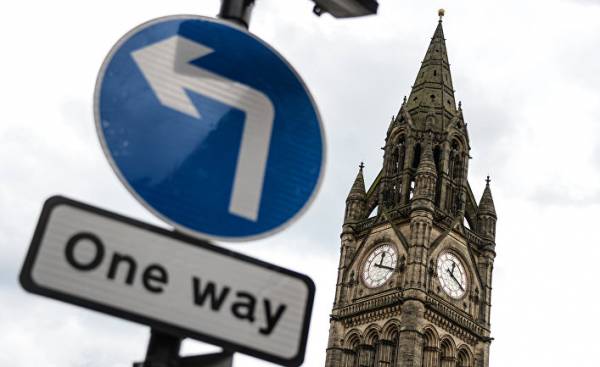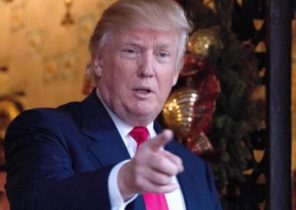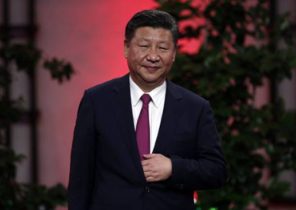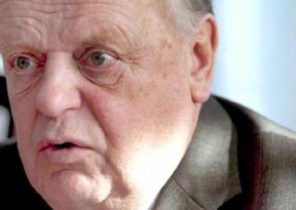
So tough is the title of your material is the magazine the Economist. Moreover, they are without any social and ornate passages of writing: the UK does not constitute such a pitiful sight since the Suez crisis.
The authors are with characteristic British wit, I remember the brilliant English writer-novelist of the twentieth century, Evelyn (Evelyn Waugh), who was also an outstanding journalist.
In may 1942 in a letter to his wife, the writer tells the true story, which reflects the folly of the British military. The soldiers of the British commando parts, which was temporarily stationed in the estate of Lord Glasgow (Lord Glasgow), suggested the owner to get rid of the old stump with dynamite, proudly assuring the Lord that will produce an explosion with such skill that even the stump of “fall precisely on shestiperova the coin”. The soldiers are drunk at the table, talks on the bookshelves, and after dinner the whole company went to observe the undermining of this miserable stump. But here, instead of to fall to the coin, as promised, the combat soldiers, the stump flew into the air 50 feet, having dragged behind itself an entire acre of land and planted a plantation of young trees. Lord Glasgow in despair from the sight and rushed to his castle, and found that as a result of this explosion, all the Windows of the castle shattered. Shaken by the Lord, unable to restrain their emotions, rushed to hide in the bathroom. And there “the whole ceiling, which was rocked by the explosion, collapsed him right on the head.”
This passage experts outlined the prelude to their reasoning about the current state of the UK, and I write that a year after euroreferendum UK resembles a castle Lord Glasgow. Analysts believe that the most serious and significant damage was caused to its internal politics. The conservative party is in chaos, so the leftist leader of the labour party Jeremy Corbyn can talk about what’s going to become Prime Minister in six months. Thus, at least a serious blow, according to experts, was caused and the position of Britain on the world stage: it is now worse than ever since the Suez crisis of 1956, when the United States thwarted an attempt by Anthony Eden (Anthony Eden) to restore British influence in Egypt.
Experts Economist argue that over the decades of British foreign policy rested on three pillars: the United States, the European Union and developing countries. Winston Churchill, the son of a British aristocrat and an American heiress to a large fortune, for the first time used the phrase “special relationship” to describe blood and language relations of great Britain with America. As a former Empire, Britain had close ties with dozens of African and Asian countries. Boasting one of the largest economies in Europe, it largely determined the future of Europe, often acting as a counterweight to the Franco-German axis.
The authors of the Economist, noted that British diplomats continue to delude themselves with illusions. But it is worth remembering that the Suez crisis demonstrated that the United States simply thrown overboard “special relationship” as soon as it came into conflict with their national interests. The British, experts said, has always been the players of “lower class” in Europe, but for all that, these three pillars of its foreign policy that not only stand the test of time, but also to ensure sustainability. The UK’s membership of the EU strengthened its influence in the United States, and Vice versa, a close relationship with America has added to its influence in Europe. The international influence of great Britain increased because of the EU, in which she had trade agreements with 53 countries around the world.
Britain’s decision to leave the EU, obviously, will reduce its influence in Europe. Even if the British manage to negotiate favourable access to the single market, they will cease to be a part of making it decisions. The UK has already found its weakness: its chief negotiator on Bracito David Davis (David Davis) still failed to do anything substantial, but he managed to make a number of concessions to the European Union. As written by experts, unexpectedly found the isolation of the UK in the EU: the current Prime Minister Theresa may asked to leave the courtroom when even the last partners — the allies begin the discussion vnutrivuzovsky Affairs.
Moreover, experts believe that the UK leaves the EU at a time when its relations with the US are at risk. Why? British experts explained their position by the following argument: today, the President of the United States is guided by the slogan “Make America great again”. Hell Donald trump impermanence. Policy in relation to the new US President and what he says and does, divided into diametrically opposite directions. And that, believe UK experts, means that the closer to the current US President will be the Kingdom, the more it will alienate those who are in opposition to Trump. According to the results of a survey conducted by the American research organization Pew Research Centre in 37 countries, only 22% of respondents believe that Donald trump will lead the “right” foreign policy. By the way, Barack Obama was trusted by 64% of respondents in the last year of his presidency.
The authors of the article in the Economist pose the question: what was the third pillar? The highest card of the supporters of “Brassica” — globalism. Proponents of globalization argue that, without being tethered to a “decaying corpse of Europe”, they will be free to interact with developing countries. Experts ask, does membership in the EU somehow prevented British business from doing business with the third world? In contrast, the British experts believe that the emerging economies are primarily interested in access to the European market with its 500 million population.
Experts come to a disappointing conclusion: logic, according to which in the old system, these components reinforce each other, in the next few years will begin to run in the opposite direction, whoever was in power. Henry Kissinger (Henry Kissinger), most recently speaking at a London conference, I noticed that Brakeset gives a chance to renew the transatlantic partnership. The authors remind us that this legendary and respected politician missed one aspect. When he was the head of the US foreign policy, Kissinger asked one very important question: “Who do I call if I need to talk to Europe?” Obviously written by experts, America will spend more time on the phone with friendly countries within the EU, not one that is outside the Union. After all, trump’s visit to France in the Bastille Day already appointed, and his possible visit to the UK in limbo. Experts predict that developing countries will be more interested in dealing with influential blocks than a small country with specific regulations and changing policy. And that, in their opinion, will happen even faster if the UK would choose the Corbin, which specializiruetsya that criticizes the leading countries of the world and how they believe, tends to be a minor countries.
Since the 1980s the UK and USA were the main supporters advanced while the ideology of neoliberalism. British consultants toured Europe and the countries of the former Soviet Union, giving lessons of privatization. The Swedes have done their social security system available for business. The Germans tried to adopt “capitalism joint-stock companies”. However, the ideology of neoliberalism has seriously suffered as a result of the 2008 financial crisis On the UK and US since then swept a wave of populism, which, experts believe, gave rise to Brakit on one side of the Atlantic, but trump on the other. Supporters of leaving the EU argued that a positive outcome of euroreferendum will give rise to “spring Brassica” as “the obsolete system” threatens to fall, and the Euro fell sharply in price. Instead, the EU was in the best for many years to form in the Elysee Palace came a young reformer, and the Franco-German axis remains strong. On the UK, on the continent, writing as “sick man of Europe.”
In the footsteps of the Suez crisis, Dean Acheson (Dean Acheson) noted that Britain “has lost an Empire, but was not able to determine for themselves a new role.” In fact, in the decades of post-Imperial Britain has mastered the multiple roles: the “pivot point” between Europe and America, the luminary of globalism in a world where the steadily advancing process of globalization, and the main supporter of neoliberalism. But then due to the financial crisis and Brassica it in one fell swoop lost all of these functions. In short, according to the Economist, the Windows are broken and the ceiling fell.







